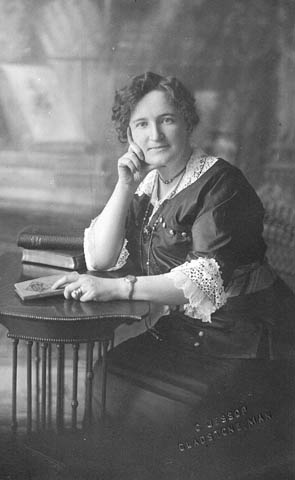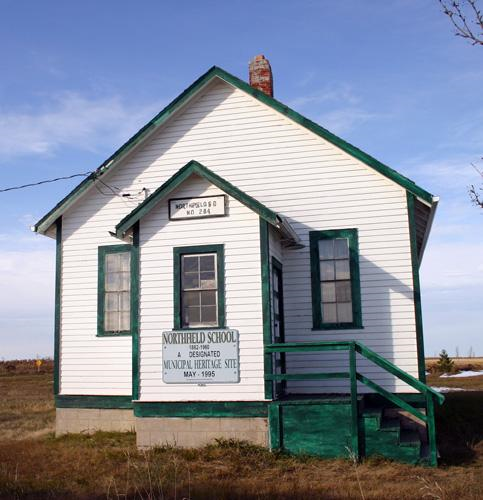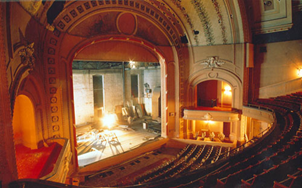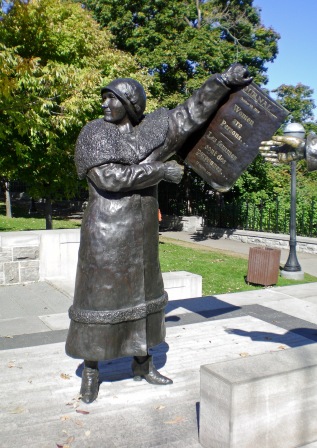Celebrate Women's History Month! A Feature on Nellie McClung
 Nellie
McClung is remembered as a suffragist, politician, temperance
leader and writer; but did you know that she was also quite the
traveller? Starting out in Ontario, Nellie made her way through
Manitoba, Alberta, and British Columbia, leaving a trail of
historic sites throughout the western provinces.
Nellie
McClung is remembered as a suffragist, politician, temperance
leader and writer; but did you know that she was also quite the
traveller? Starting out in Ontario, Nellie made her way through
Manitoba, Alberta, and British Columbia, leaving a trail of
historic sites throughout the western provinces.

Born in Chatsworth, Ontario in 1873, Nellie Mooney
moved with her family to Manitoba as a child. She was a pupil at
the rural Northfield School, a municipal
heritage site located in South Cypress, Manitoba, where she
returned in 1896 to briefly teach at the age of sixteen. After
starting her own family with husband Robert Wesley McClung in
Manitou, Nellie moved to Winnipeg where she quickly became a
prominent leader in women's suffrage and temperance movements.
 Notably, on
January 28, 1914 at the Walker Theatre NHS, Nellie and her
fellow suffragists staged a mock play, ridiculing Premier R.P.
Roblin's opposition to women receiving the vote. Acting as members
of parliament, with Nellie playing the role of Premier, the women
discussed a number of their own issues as if pertaining to men -
whether to give men the vote, and whether to allow them equal
guardianship over children. Ultimately, the play was a success and
helped advance the cause of women's suffrage. In January 1916,
Manitoba became the first Canadian province to give women the right
to vote.
Notably, on
January 28, 1914 at the Walker Theatre NHS, Nellie and her
fellow suffragists staged a mock play, ridiculing Premier R.P.
Roblin's opposition to women receiving the vote. Acting as members
of parliament, with Nellie playing the role of Premier, the women
discussed a number of their own issues as if pertaining to men -
whether to give men the vote, and whether to allow them equal
guardianship over children. Ultimately, the play was a success and
helped advance the cause of women's suffrage. In January 1916,
Manitoba became the first Canadian province to give women the right
to vote.
In 1914, the McClungs moved to Edmonton, Alberta where Nellie
began her political campaign. In 1921 she was elected as a
member of the Alberta Legislative Assembly, a term which lasted
until her defeat in 1926.
.png)
Nellie again moved to Calgary, Alberta in 1923 to what is
now referred to as the Nellie McClung House, a provincial
historic site. She resided in this elegant 20th-century home until
the mid-1930s during which time she wrote many popular novels as
well as newspaper articles and essays.
In 1927, Nellie united with Emily Murphy, Irene Parlby, Louise
McKinney and Henrietta Muir Edwards in pressing for the right of
women to be recognized as persons and eligible to join the Canadian
Senate.
 Despite an initial
defeat by the Supreme Court of Canada, on October 18, 1929 the
British Privy Council reversed the decision and ruled in favour of
the "Famous Five" - a landmark ruling in the history of women's
rights in Canada. A monument recognizing this famous case and the
contributions of Nellie and the Famous Five can be found on the
Public Grounds of the Parliament Buildings NHS in Ottawa, Ontario.
There is also an identical monument located in downtown Calgary,
Alberta.
Despite an initial
defeat by the Supreme Court of Canada, on October 18, 1929 the
British Privy Council reversed the decision and ruled in favour of
the "Famous Five" - a landmark ruling in the history of women's
rights in Canada. A monument recognizing this famous case and the
contributions of Nellie and the Famous Five can be found on the
Public Grounds of the Parliament Buildings NHS in Ottawa, Ontario.
There is also an identical monument located in downtown Calgary,
Alberta.
Nellie and her husband retired in 1934 to a wooden,
one-and-one-half storey country home in Saanich, British Columbia
named the Fullerton/McClung
Residence.
.png) Here, in
her declining years, Nellie continued to actively write, penning
numerous books including her autobiography and Leaves from Lantern
Lane (the name inspired by the hanging ship lantern above the
garage door of the house). In addition to her writing, Nellie
remained a public figure, becoming the first woman member of the
Canadian Broadcasting Company Board from 1936 to 1942 and the sole
Canadian female delegate to the League of Nations in 1938. Nellie
resided in this home until her death in 1951.
Here, in
her declining years, Nellie continued to actively write, penning
numerous books including her autobiography and Leaves from Lantern
Lane (the name inspired by the hanging ship lantern above the
garage door of the house). In addition to her writing, Nellie
remained a public figure, becoming the first woman member of the
Canadian Broadcasting Company Board from 1936 to 1942 and the sole
Canadian female delegate to the League of Nations in 1938. Nellie
resided in this home until her death in 1951.
Interested to learn more? Visit these other registered sites
associated with Nellie McClung:
Millford Cemetery
Manitou Town Hall
Emily Murphy Residence
Radio Canada Building